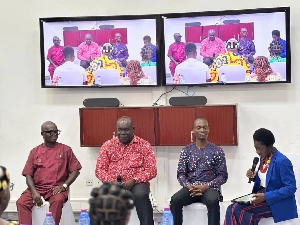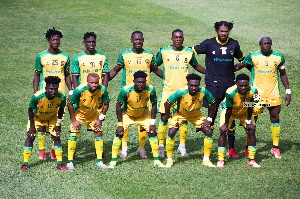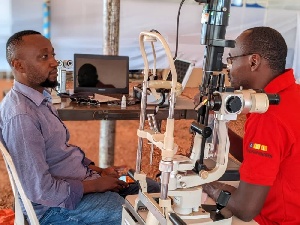- Home - News
- Elections 2024
- News Archive
- Crime & Punishment
- Politics
- Regional
- Editorial
- Health
- Ghanaians Abroad
- Tabloid
- Africa
- Religion
- Photo Archives
- Press Release
General News of Wednesday, 28 May 2025
Source: www.ghanawebbers.com
Ghanaian families drop local languages to show off English skills – experts warns against language shift
Language experts are worried about Ghanaian families speaking English at home. Many parents believe this shows their children speak good English. However, experts warn this trend harms local language preservation.
Professor Opanin Kofi Agyekum leads the Department of Linguistics at the University of Ghana. He states that choosing English does not elevate anyone's status. Every language is valuable and should be used to support its speakers.
“In many homes in Ghana, people do not speak their native languages,” he said. “They prefer to use English to show off.” He emphasized that cultural heritage is tied to language.
Prof. Agyekum urges Ghanaians to value their local languages. If people appreciate their native tongues, they will pass them on to future generations. “We must encourage our children to take pride in their mother tongues,” he added.
He spoke at the 2025 AfroCuration Ghana event, which gathered speakers of seven Ghanaian languages. The event aimed to promote African identities on Wikipedia and preserve local languages.
Participants created content in Twi, Dagbani, Gurene, Moore, Ewe, Kusaal, and Dagaare. Over 80 attendees learned how to edit and translate Wikipedia articles about African culture using reliable sources.
Dr. Emmanuel Antwi Fordjour teaches at the Department of Language and Communication Sciences. He believes language is crucial for culture and identity but noted some feel shy speaking their own languages.
Dr. Fordjour encouraged educated Ghanaians to lead efforts in preserving native languages. “If linguists don’t act now, these languages may become extinct,” he warned.
Dr. Mrs. Faleke Victoria Ogunnike from KNUST stated no language should be labeled "local." She warned that losing a language means losing important knowledge too.
“In Ghana, we favor foreign languages like English and French,” she said. Dr. Ogunnike pointed out that while foreign speakers encourage preservation of local tongues, many Ghanaians neglect theirs instead.
She believes students excelling in indigenous languages should have university opportunities since it reflects intelligence.
Professor Akwasi Adomako suggested using art as a way to preserve local languages. Artworks convey messages reflecting culture and language.
“Art speaks through its visuals; it communicates with you,” he explained using his piece "My Hands Are Not for Begging" as an example.
The event took place at Kwame Nkrumah University of Science and Technology (KNUST) in Kumasi. It was organized by the Wikimedians of Twi Language with support from various organizations including the Wikimedia Foundation.
Professor Charles Ofosu Marfo from KNUST called the initiative vital for promoting indigenous Ghanaian languages online. He highlighted that language reflects identity and heritage beyond mere communication tools.
He praised the event for empowering youth to create content in their mother tongues, helping preserve linguistic diversity in Ghana.
Jemima Antwi leads AfroCuration Ghana 2025 and noted over 2,000 African languages exist but many are absent online. “Wikipedia can help change this narrative,” she stated passionately about digital inclusion efforts for all African voices.
Harriet Henry Bayel from the Global Open Initiative Foundation echoed concerns about documenting African languages online urgently: “AfroCuration allows us to take action.”
AfroCuration is more than just a program; it’s a movement combining art, language, heritage, and digital skills for young Africans aiming to protect their cultures online.











